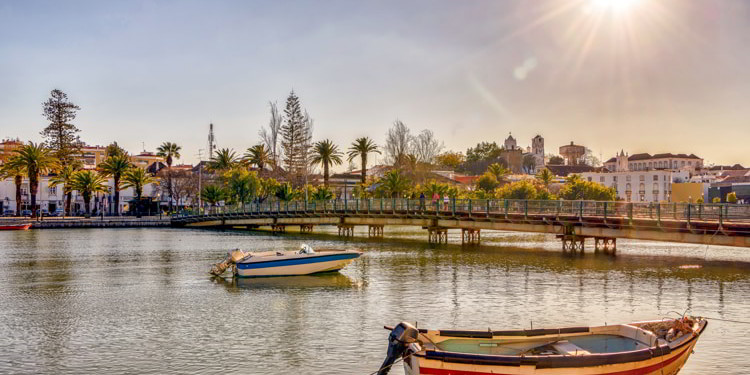In the southeastern corner of Portugal, where the Atlantic meets the shore, the ancient town of Tavira has found a modern vocation. Set on a sun-blessed coast of islands and lagoons, Tavira is proving a magnet for people in search of a new life.
I singled it out as my home after walking the whole length of the country, and many other foreigners have succumbed to its charm and put down roots here.
Tavira is a river town, just a short ferry ride from the sea. It’s not too big— the population of the municipality is about 28,000—so within minutes of driving out of town you pass through orange groves and up into gentle rolling hills.
The winters in the eastern Algarve are mild and spring comes early. The almond trees blossom in January and the first broad beans reach the table in February.
In town, the dominant colors tend to be the blue of the sky, the white walls of so many buildings, and the red of the tiled roofs. Tavira is gloriously walkable, with narrow cobbled streets and plenty of cafés and restaurants with outdoor tables. Foreigners, often of retirement age, have arrived in considerable numbers to live here and, according to local realtors, in recent years Americans and Canadians have started to feature in the international mix.
One American who settled here four years ago is Allan Ensor, a former school psychologist.
How Allan Ensor Discovered Tavira Was His Overseas Haven
Ensor, 75, has on his business cards the words “Missouri by birth, Tavira by choice.”
He said his original intention had been to settle in Lisbon. Then, his one contact in Portugal invited him to the Algarve for Thanksgiving. He was smitten.
Within days he had found an apartment in Tavira and everything just slotted into place.
Becoming Part Of The Community
He now leads regular Tai Chi classes in a quiet city square, with a white-washed church on one side and a café on the other.
“I have become part of the community here, largely through the Tai Chi classes,” said Ensor. “This was all just luck and happenstance. Tavira is a very easy place to meet people.”
Immediately after the Tai Chi, on Saturday mornings, everyone heads for the café, and typically there might be Italians, British, and Dutch gathering for a coffee and exchanging the latest gossip.
Life In Portugal
One thing which many newcomers to Portugal experience as a challenge is learning the language. Some take the route of not bothering because many people in the Algarve, Portuguese and foreigners alike, speak English.
Portuguese, a Romance language, is not particularly easy—it can come across as an impenetrable Slavic-sounding jumble. But there is good news. The Portuguese are warmly appreciative of strangers who take the trouble to learn some of their language. If you persevere, heart-felt compliments will come your way.
The cost of living in Portugal is generally low, though some things, for example electricity tariffs, are expensive, as are second-hand cars. Little service jobs tend to be moderately priced. At my local barber’s shop in Tavira, I pay six euros for a serious beard trim.
Options for food shopping in Tavira range from a Continente hypermarket to a 7-hectare organic farm called Maria Flaminga in the southwestern part of town, tucked behind an Aldi supermarket. The farm shop, open Tuesday to Saturday, offers a good selection of vegetables and fruit.
Portugal has an extraordinary selection of good wines at reasonable prices and a lot of Algarve produce, from oranges to honey, is abundant and inexpensive. Organic fare comes at a premium.
Most retirees coming to live in Portugal can rely on their pensions.
When it comes to real estate, expect to pay monthly rents of about 750 euros for a one-bedroom apartment, 1,000 to 1,200 euros for two bedrooms, and around 2,000 euros for a house with a swimming pool.
Realtors in town say demand is brisk, and it’s often hard for them to find properties that match the kind of thing clients want, like a house with a garage and a view over the lagoons. Unfurnished accommodation can be hard to find, and you might have to accept a furnished let.
If you’re looking to buy a home in Tavira, asking prices range from about 160,000 euros for a one-bedroom flat in the town center to villas for around 5 million euros. A three-bedroom house with a little land in the countryside near town costs around 450,000 euros. Bargaining over price is very much part of Portuguese culture.
Recommended practice is to hire a lawyer who checks that what actually exists on the ground corresponds to what it says on the official documents lodged with the authorities. For example, does that swimming pool or borehole have the necessary official permission?
My English-speaking Portuguese lawyer came with me to check out a property that I wanted to buy. She nodded her approval. With my lawyer present, I then signed the papers and gave the owner a cheque representing a 15% deposit.
My lawyer takes a fee of 1% of the property purchase price and another 6% goes on government property taxes and other fees.
Portugal has a tax-funded public health care system, known as the Serviço Nacional de Saude (SNS), which is similar to the one in the U.K. Most essential medical services are free of charge. Typically, patients need to cover a percentage of medicine costs at the pharmacy. The SNS generally does not cover dental care.
The nearest big hospital is in Faro. Private health insurance is also available in Portugal, with costs varying from several hundred euros a year to thousands. Should you need an ambulance here, dial 112.
Tavira is well provided with a lot that the expat might need, from an Irish pub, The Black Anchor, with its lunchtime quizzes, to a well-stocked library housed in a former prison. There are banks, English-speaking lawyers and realtors, and a big municipal food market.
Tavira has some excellent restaurants but not the range of cultural events that capital cities offer. If you crave the buzz of the big city then this likely isn’t the place for you. But, for lovers of the seashore and nature in general, bikers, birders, hikers, those who appreciate living in a human-scale provincial town with a very international population, then you’ll find it all in Tavira.
Sincerely,
Stephen Powell
Full-Time Portugal Expat










